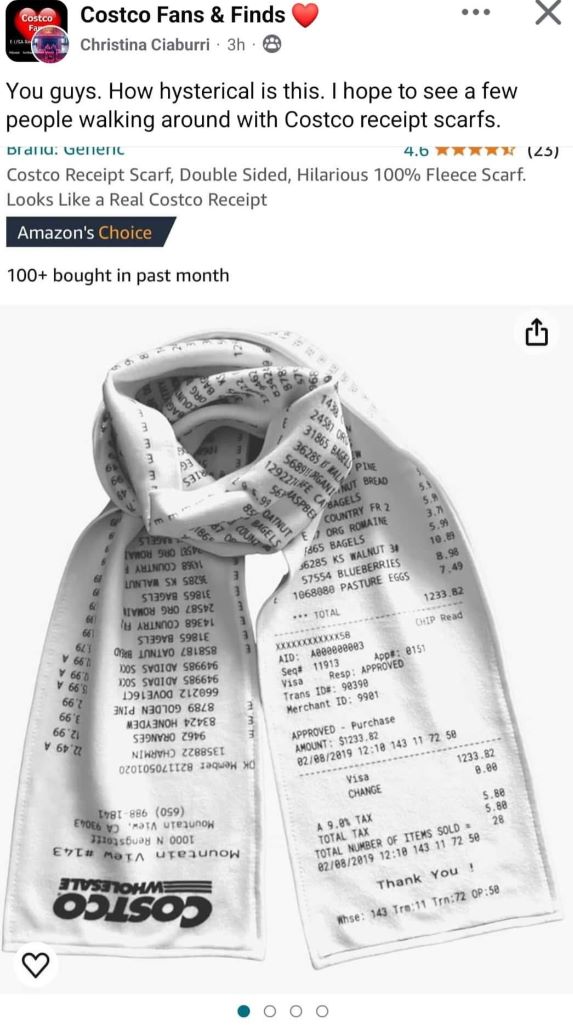Fast fashion meets mega-retail obsession in an odd new trend that's raising eyebrows across social media.
A Reddit user recently spotted an Amazon listing for a scarf designed to look like an oversized Costco receipt, triggering a conversation about excessive brand loyalty and consumer culture.
What's happening?
A photo shared with Reddit's r/anticonsumption community shows an unusual fashion accessory: a scarf that mimics the famously long receipts from wholesale retail giant Costco.

The post, titled "In 'glorification of consumerism' we have," resonated with the users, who expressed concern about the growing trend of turning retail experiences into fashion statements.
"This is very ironic," wrote one person.
One commenter noted, "People are sometimes so devoted to a brand they are happy to be a walking advert for it." Truly, retail loyalty has evolved beyond simple shopping preferences into a form of identity expression.
Why is brand-focused consumerism concerning?
When brand loyalty transforms into identity-defining behavior, it often leads to unnecessary purchases and waste. This excessive consumerism contributes to increased manufacturing demands, packaging waste, and transportation pollution, all of which accelerate our planet's overheating.
The irony of wearing a receipt-themed scarf is particularly striking, as paper receipts themselves pose environmental challenges. The United States alone uses an estimated 10 million trees annually just for receipt paper, while the production process requires billions of gallons of water and generates substantial chemical waste.
Is the company doing anything about this?
While Amazon has launched its Climate Pledge initiative, the company's marketplace continues to promote novelty items that celebrate excessive consumption.
🗣️ What should the government do about the fast fashion industry?
🔘 Set strict regulations 🚫
🔘 Incentivize sustainable options 💰
🔘 Use both regulations and incentives 🏛️
🔘 Nothing 🙅
🗳️ Click your choice to see results and speak your mind
However, they have made some progress in reducing packaging waste through their Frustration-Free Packaging program and increasing the use of renewable energy in their operations.
What's being done about consumerism more broadly?
A growing movement of conscious consumers is pushing back against excessive brand loyalty and unnecessary purchases.
Many retailers are responding by implementing take-back programs and exploring circular economy models that extend product life cycles. Some innovative companies are even creating fashion statements that promote environmental awareness instead of consumption.
Individual shoppers can make a difference by being more mindful about their purchasing decisions. Consider whether items add value to your life, opt for durable products that last longer, and support brands that prioritize environmental responsibility over viral marketing stunts.
Even small changes in shopping habits can reduce our environmental impact while saving money.
Better yet, many people find creative ways to express their personalities through sustainable fashion choices, like shopping secondhand or supporting local artisans using eco-friendly materials. These alternatives offer unique style opportunities while contributing to a healthier planet.
Join our free newsletter for good news and useful tips, and don't miss this cool list of easy ways to help yourself while helping the planet.









